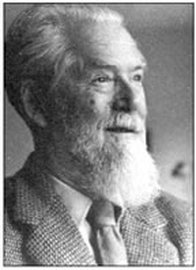John Macmurray (1891-1976)

John Macmurray was born at Maxwellton in the Scottish borders in 1891. He moved (with his family) to Aberdeen at around the age of ten and attended Aberdeen Grammar School and Robert Gordon’s College before proceeding to Glasgow University, from which he graduated both M.A and LLB. After completing his Honours Classics work at Glasgow in September 1913, he joined the long tradition of Snell Exhibitioners, of whom Adam Smith was one. These were exceptional Glasgow graduates awarded scholarships to study at Balliol College, Oxford, and there Macmurray studied history and philosophy, though his tutor, the philosopher A. D. Lindsay, helped strengthen his interest in philosophy by bringing him to see it as a preparation for life and service.
During the First World War Macmurray served with the British army in France, and was awarded a Military Cross in 1918. Early in 1917 he wrote his first known published piece of writing – ‘Trench Religion’ – a short reflection on a soldier’s image of God in the midst of the carnage at the front. In 1919 this appeared in a book entitled The Army and Religion, and the same year he returned to Balliol where his academic career properly began with his appointment to the John Locke Scholarship, culminating in an M.A. with distinction in litterae humaniores.
His first academic post was a lectureship in philosophy at Manchester University, but before long he accepted an invitation to become Professor of Philosophy at Witwatersrand University in Johannesburg. His time in South Africa lasted only eighteen months before he returned to Oxford and to Balliol as Jowett Lecturer and Classical Tudor, a position he held from 1922 to 1928. In 1928 he moved again, this time to become Grote Professor of Mind and Logic at University College London. There he remained until 1944 when he finally returned to Scotland as Professor of Moral Philosophy at the University of Edinburgh in succession to A. E. Taylor, who had also preceded him at Manchester. He retired from the Chair of Moral Philosophy at Edinburgh in 1957. Having for most of his life been a somewhat hesitant Christian, in retirement he became a member of the Society of Friends. He died in 1976.
John Macmurray’s most substantial philosophical work arose from the Gifford Lectures he gave at the University of Glasgow in 1953-4. These were subsequently published in two volumes – The Self as Agent (1957) and Persons in Relation (1961). In the introduction to these lectures he identifies a crisis in philosophy – “The tradition is broken, and cannot be re-established” – but he rejects both the leading philosophies of his day, existentialism and logical empiricism. He thus remained largely an outsider in world of professional British philosophy, and this includes philosophy in the Scottish universities. But elements of the kind of philosophy he learnt at Glasgow persisted throughout his career, first the belief that philosophy should address itself to a wider cultural context than simply that of professional colleagues, and secondly the conviction that philosophy must ‘start from common experience at its most universal’. At a minimum, then, his conception of philosophy can be said to have a strong affinity with the Scottish intellectual tradition, and this may be sufficient to make him the last significant contributor to the Scottish philosophical tradition.
Post-Enlightenment Philosophers
- Lady Mary Shepherd (1777-1847)
- Thomas Brown (1778-1820)
- Sir William Hamilton (1788-1856)
- Thomas Carlyle (1795-1881)
- James Frederick Ferrier (1808-1884)
- Alexander Bain (1818-1903)
- Alexander Campbell Fraser (1819-1914)
- James Hutcheson Stirling (1820-1909)
- John Veitch (1829-1894)
- Henry Calderwood (1830-1897)
- Edward Caird (1835-1908)
- Robert Flint (1838-1910)
- William Minto (1845-1893)
- Sir Henry Jones (1852-1922)
- David George Ritchie (1853-1903)
- Andrew Seth Pringle Pattison (1856-1931)
- James Seth (1860-1925)
- Robert Latta (1865-1932)
- Norman Kemp Smith (1872-1958)
- Archibald Allan Bowman (1883-1936)
- John Macmurray (1891-1976)
- C A Campbell (1897-1974)
- David Daiches Raphael (1916-2015)
- George Elder Davie (?)